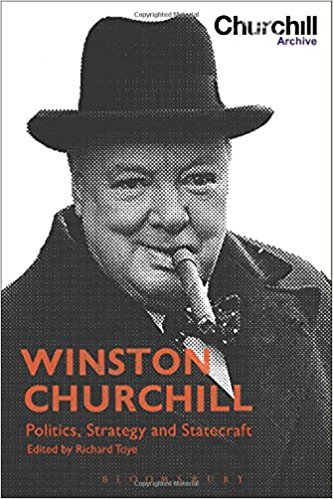
Finest Hour 176
Books, Arts & Curiosities – Fifteen Shades of Churchill

August 21, 2017
Finest Hour 176, Spring 2017
Page 46
Review by John Campbell
Richard Toye, ed., Winston Churchill: Politics, Strategy and Statecraft, Bloomsbury, 2017, 231 pages, $29.95/£21.99. ISBN 978–1474263856
Readers of Finest Hour know better than anyone that there is no end to the outpouring of books about Winston Churchill, focussing on ever more obscure corners of his titanic life. This slim volume, on the contrary, seeks to encompass the most important elements of his whole career, not in another full-scale biography—there have surely been enough of those—but in fifteen short essays on different strands or themes.
It is not entirely clear who it is aimed at. It aspires simultaneously to be “suitable for those coming to Churchill for the first time” while also “providing new insights for those already familiar with his life.” But inevitably it falls between stools—too academic for the first category, but too brief to offer much to the second. It is best seen as a concise survey of how a number of distinguished scholars view Churchill today.
What is original, however, is that the endnotes provide full references to the papers held at Churchill College, Cambridge, now digitised and available online, while an e-book edition provides links to the original documents. So perhaps the real target audience is students. The fifteen essays are of variable quality. The first two or three, covering Churchill’s early career, are a bit perfunctory, adding little to the received picture, though Peter Catterall defends Churchill’s controversial 1925 decision as Chancellor of the Exchequer to put Britain back on the gold standard, arguing that it could have worked and was less responsible for provoking the general strike the following year than has often been alleged.
The later, more thematic, essays are more interesting. Chris Wrigley contributes an excellent piece explaining Churchill’s visceral hostility to socialism on the one hand and warm support for trade unionism on the other. “Trade unions,” he insisted in 1908, “are not socialistic. They are the antithesis of socialism.” Forty years later he was still urging that “every craftsman or wage earner should of his own free will be a trade unionist.” Similarly Stuart Ball traces the consistency behind Churchill’s up-and-down relationship with the Tory party—“ratting” in 1904, “re-ratting” in 1924, rehabilitated between 1924 and 1929, isolated in the 1930s, fully vindicated in 1940—suggesting finally that he was a much better party leader after 1945 than is usually acknowledged, whose moderation enabled the Tories to capture and hold the centre ground for the next fifteen years.

2025 International Churchill Conference
At the midpoint of the book, Paul Addison contributes an elegant piece contrasting the important part played in his life by three particular women (his mother Jennie, his nurse Mrs Everest, and his long-suffering wife Clementine) with his initial opposition to women’s suffrage (“Contrary to natural law and the practice of civilised states”), which changed under the impact of women’s roles in both wars. “When I think what women did in the war,” he acknowledged after 1945, “I feel sure they deserve to be treated equally.”
Richard Toye (who also edited the book) makes a balanced case that Churchill, though of course “racist” by modern standards, was for his time a relatively enlightened imperialist. “Although he believed non-whites were racially inferior, this did not mean that he believed they had no rights at all, and he was genuinely concerned to ensure what he regarded as fair treatment (stopping short of equality).”
Probably the most unfamiliar (but topical) subject is Churchill’s relationship with the Islamic World. Warren Dockter not only demonstrates the important role he played as Colonial Secretary in re-shaping the Middle East after 1918, with consequences which still reverberate today, but highlights his lifelong fascination with and respect for Islam, which led him usually to favour Turkey over Greece and, in India, the Moslems over the Hindus. Though supportive of the creation of Israel, he wanted the new state to respect “the legitimate rights of the Arabs.”
Richard Overy gives a clear account of Churchill’s early and consistent enthusiasm for the military use of air power, without regard to the ethics or morality of bombing civilians. Jeremy Black considers his record as a strategist in the Second World War, always favouring peripheral theatres where possible—as he had in the First War— and always wanting to attack, often having to be restrained by his commanders. David Woolner (Resident Historian of the Roosevelt Institute) gives a solid account of the Churchill-FDR relationship, as documented in their correspondence. Finally, in two somewhat overlapping essays, Kevin Ruane charts Churchill’s journey from bellicose Cold Warrior, willing to use the threat of America’s superiority in nuclear weapons to force Soviet withdrawal from eastern Europe, to ardent peacemonger anxious before he left office for the last time to hold a summit with Stalin to rid the world of the spectre of the Bomb. If there is a theme running through all these essays, it is a reminder of the generosity and humanity that always lay behind Churchill’s outward bluster and bombast.
John Campbell’s books include major biographies of F. E. Smith, Aneurin Bevan, Edward Heath, Margaret Thatcher, and most recently Roy Jenkins.
Subscribe
WANT MORE?
Get the Churchill Bulletin delivered to your inbox once a month.



